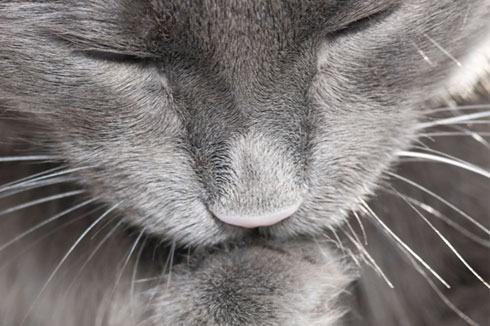
Elderly cat health problems are as varied as their genetics. Here’s some preventative maintenance steps that you can control and maintain…
Prevention is far better than the cure
Your elderly cat needs extra care and attention, because she has fewer reserves and metabolic resources to draw on.
This means that when you perceive elderly cat health problems, they cannot cope for long without specific advice for you and veterinary intervention.
An excellent way to prevent sudden emergencies or a preventative rapid deterioration is to seek regular elderly cat reviews with your vet.
So, when does a cat become elderly?
Metabolically, cats are not actually ‘aged’ until 16 years old, which means they can still recover from many of the afflictions of old age if the problems are discovered early and do not reach the limits of feline reserves and adaptability.
There is a big difference between a cat aged 5 years, and one aged 8 years – although it is ‘only 10 human year equivalents’.
Bigger again is 10 years old to 13 – those are the years where early signs of chronic (long term) diseases show up. Some cats live to 26 years old, some to only 9 years old before succumbing to to terminal illness.
Finding out which is which just means regular weigh-ins (there is no medical condition that makes a cat gain weight – not even hypothyroidism) and at the very least kidney check ups.
See how well Miss Murphy does in her annual senior health check. She knows it is all for her own good!
Feeding An Elderly Cat To Better Health
Feeding an elderly cat does not mean simply providing easily chewable and digestible solids. Here’s how you can make a difference to her wellbeing…
The cat with an elderly health problem can often be managed by diet alone.
Selecting the best cat food for your feline friend now they are elderly requires that you juggle their food preferences, your veterinarian’s recommendations for any existing health problems, and the availability and cost of the best food options.
Even diabetic cats can often maintain themselves with a dietary change and some closer monitoring.
Certainly diet is an integral part of caring for your elderly cat. There are very useful diets and supplements incorporating high levels of Omega-3 fatty acids for any cat with arthritis (Hills j/d, Eukanuba Mobility, Royal Canin Mobility Support). If your cat will eat them – problem solved!
However, it can be tricky to get an elderly cat to accept a new diet if they are fixated on the existing one!
That is where the art of feeding ANY any cat comes in! Some of the ‘tried and true’ methods are mixing the old and the new (in the container if dried, and premix so the flavours cross over for a few days).
Or grinding up the new dried food and ‘breadcrumbing’ a favoured wet food or meat, so the cat gets the taste and texture of the new food in a less intimidating format. We humans tend to forget how sensitive a cat’s nose is, and a big bowl of new food can be overwhelming.
Since a cat’s natural tendency is to avoid food it does not know (because it might be poisonous), then it is not surprising that there is a high resistance and even refusal factor!
The Three Biggies
The BIG THREE medical issues for Senior cats are Arthritis, Dental Health and Kidney Function.
Safe Flea control and feeding an elderly cat appropriately are very important for their comfort and yours!
Elderly cat health problems can be overcome and our senior Fluffy’s are living longer because of early assessment and intervention. (see above)
Some even revert to being elderly cats without health issues as modern veterinary medicine evolves to manage, if not cure some of the chronic problems of the past. You just have to know what to look for, and when to ask for help to care for your cat now that they are elderly!
Elderly Feline Arthritis Care
Related Reading
We used to think that cats did not get Arthritis, and that slowing down was just a function of growing old.
Now we know that 90% of cats over the age of 10 years have arthritis, and we all appreciate that chronic pain is debilitating.
The good news is that there are now some great ways to alleviate that pain, and your oldie will even start playing again!
If your feline friend (of any age) is not able to jump up on your kitchen bench easily (or over the garden fence!), then think about addressing their pain.
Many cats benefit from Acupuncture.
There is actually a version of acupuncture called Aquapuncture. Under sedation, the veterinary acupuncturist injects Vitamin B12 into the Acupuncture Points. It means your cat only has one visit, is pretty immediately free of pain, and the results usually last 1 to 2 years!
80% of the cats treated for Dr Kim have done extremely well.
In addition, there are Omega-3 supplements, a special Joint Diet (from Hills), Deer Velvet, Green Lip Mussel supplements, safe pain relieving drugs, and a even course of injections (Cartrophen – originally developed for racehorses ! but cats benefit as well).
The NSAID drug Meloxicam has recently been shown to not only alleviate arthritis pain, but also to extend the functional life of kidneys – Clever Cats!
If you think your elderly cat might have health problems, you may find our post on diabetes in cats useful
